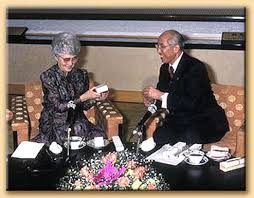
Apr 29, 2015 | Senza categoria
 «There is much talk here about the building of a common European home. We are convinced, however, that although this endeavour is very necessary, it will not be complete unless we think of it as a part of that “global village” that is now the Earth on which we live. This idea came to me also from the concern expressed in your letter about the precarious condition of our natural environment. (…) In fact, there are increasingly alarming analyses from scientists, politicians and international commissions about our ecosystem. People everywhere are launching proposals in an effort to heal our ailing world. (…) In the final analysis, ecology represents a challenge which can be met only by changing mentalities and forming consciences. It has already been demonstrated by very competent scientific studies that neither technical nor economic resources are lacking for the improvement of our environment. Instead, what is lacking is that spiritual supplement, that new love for the human person, which makes all of us feel responsible towards all the others in a common effort to manage the resources of the earth in an intelligent, just and balanced manner.(…) This question of a just distribution of goods in the world, of helping the poorer populations, of the solidarity of the north towards the south, of the rich towards the poor, is the other side of the ecological crisis. If the immense economic resources destined to boost the war industry and a super-production that requires more and more super-consumption, not to mention the waste of goods in the wealthy countries, if these enormous resources would serve, at least in part, to help the developing countries find their dignified way towards development, how much more breathable the atmosphere would be, how many forests would be spared, how many zones would not become desert wastelands, and how many human lives would be saved! (…) And yet, without a new awareness of universal solidarity, we will never take a step forward. (…) If human beings are not at peace with God, the earth itself is not at peace. Religious people are aware of the earth’s “suffering” when human beings do not use it according to the plan of God, but only for selfishness, for an insatiable desire to possess. This selfishness and desire contaminate the environment more and before any other kind of pollution, which is nothing other than its consequence. (…) Now the disastrous consequences force us to look at reality all together, in the perspective of a united world. If we don’t face this problem all together it will not be resolved. (…) If one discovers that all creation is a gift of a Father who loves us, it will be much easier to find a harmonious relationship with nature. And if one discovers also that this gift is for all members of the human family and not only for a few, more attention and respect will be given for something that belongs to the whole of humanity, present and future». Continue Reading
«There is much talk here about the building of a common European home. We are convinced, however, that although this endeavour is very necessary, it will not be complete unless we think of it as a part of that “global village” that is now the Earth on which we live. This idea came to me also from the concern expressed in your letter about the precarious condition of our natural environment. (…) In fact, there are increasingly alarming analyses from scientists, politicians and international commissions about our ecosystem. People everywhere are launching proposals in an effort to heal our ailing world. (…) In the final analysis, ecology represents a challenge which can be met only by changing mentalities and forming consciences. It has already been demonstrated by very competent scientific studies that neither technical nor economic resources are lacking for the improvement of our environment. Instead, what is lacking is that spiritual supplement, that new love for the human person, which makes all of us feel responsible towards all the others in a common effort to manage the resources of the earth in an intelligent, just and balanced manner.(…) This question of a just distribution of goods in the world, of helping the poorer populations, of the solidarity of the north towards the south, of the rich towards the poor, is the other side of the ecological crisis. If the immense economic resources destined to boost the war industry and a super-production that requires more and more super-consumption, not to mention the waste of goods in the wealthy countries, if these enormous resources would serve, at least in part, to help the developing countries find their dignified way towards development, how much more breathable the atmosphere would be, how many forests would be spared, how many zones would not become desert wastelands, and how many human lives would be saved! (…) And yet, without a new awareness of universal solidarity, we will never take a step forward. (…) If human beings are not at peace with God, the earth itself is not at peace. Religious people are aware of the earth’s “suffering” when human beings do not use it according to the plan of God, but only for selfishness, for an insatiable desire to possess. This selfishness and desire contaminate the environment more and before any other kind of pollution, which is nothing other than its consequence. (…) Now the disastrous consequences force us to look at reality all together, in the perspective of a united world. If we don’t face this problem all together it will not be resolved. (…) If one discovers that all creation is a gift of a Father who loves us, it will be much easier to find a harmonious relationship with nature. And if one discovers also that this gift is for all members of the human family and not only for a few, more attention and respect will be given for something that belongs to the whole of humanity, present and future». Continue Reading
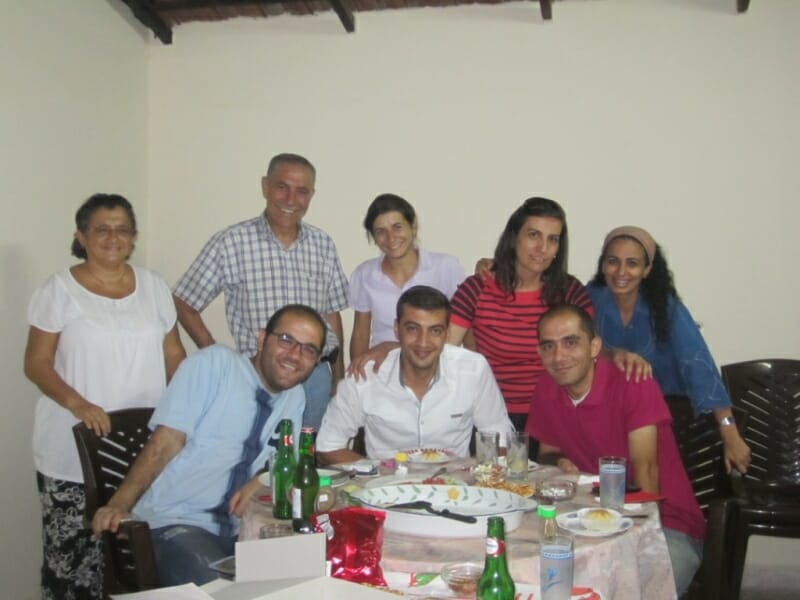
Apr 20, 2015 | Senza categoria
 With a lively gaze and gentle smile that veils some sadness, Ghada describes the tragic events taking place in the country she has chosen as her home. Ghada, what made you return to Syria?
With a lively gaze and gentle smile that veils some sadness, Ghada describes the tragic events taking place in the country she has chosen as her home. Ghada, what made you return to Syria?
At the age of tewenty I left my family and country to follow God. In September 2013 when I requested to return to Syria, I felt the same impetus as before. I was frightened by the thought that I might die, but what I felt more strongly was the attraction to go back and live alongside the people whom I had met years earlier, to help them feel that they were not abandoned. I was urged by a desire to share their life, their fears, their unstable daily lives, because the bombs rain down when you least expect it.
But isn’t there any warning before bombardments, so that you can take cover somewhere?
There are no sirens announcing the strikes, nor is there any strategy in place that would allow you to know when the rockets will hit. On the other hand, this is now the fifth year of war and one cannot stay barricaded forever. You can stop for a day, a month, but then even through the mortars thunder, life must go on: the children go to school and parents work to support their families. Everything goes on under absolute risk and uncertainty. I lived the same drama when I was in the focolare house in Lebanon, but here it is far worse, much more difficult. Here you breathe terror and violence on all sides.
You had already been to Syria in the past. Can you tell us about the changes you’ve seen?
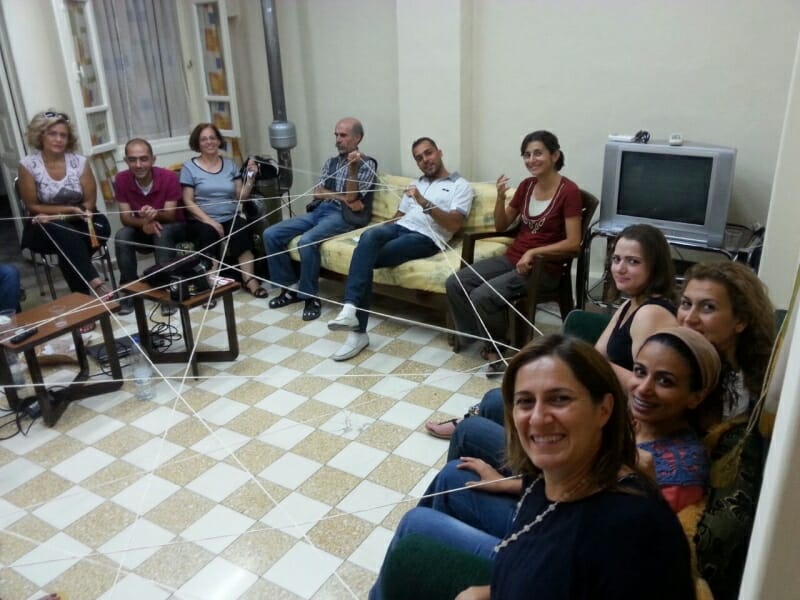 When I was in the focolar in Lebanon, I visited Aleppo, Homs and Damascus because there were still many people who wished to stay in contact with the Focolare. Because of the inner depth and sensitivity of the Syrian people, many meaningful relationships were created. We shared our Christian values that are so strongly felt in this place. Despite the plurality of Churches and rites, which is so typical of this land, there was still harmony amongst all. In 1994 when it was decided to open a focolare in Aleppo, two other focolarine and I were sent to open it. I was there for 9 years. Those were years of prosperity for Syria. The country didn’t have a public debt and the PIL was constantly rising. In the evenings we young women could go out and walk around freely.
When I was in the focolar in Lebanon, I visited Aleppo, Homs and Damascus because there were still many people who wished to stay in contact with the Focolare. Because of the inner depth and sensitivity of the Syrian people, many meaningful relationships were created. We shared our Christian values that are so strongly felt in this place. Despite the plurality of Churches and rites, which is so typical of this land, there was still harmony amongst all. In 1994 when it was decided to open a focolare in Aleppo, two other focolarine and I were sent to open it. I was there for 9 years. Those were years of prosperity for Syria. The country didn’t have a public debt and the PIL was constantly rising. In the evenings we young women could go out and walk around freely.
Now the storm has arrived. But the worst of it is the loss of any hope that this war can end. I return with the other focolarine, to say that we haven’t forgotten them, that Jesus has made us a family and this is why we want to take the same risks. Like everyone else, we go to work, to church, to market – without knowing whether or not we’ll return home again. We’re there because of the love that binds the community in Syria, and the community there knows that we’re ready to give our lives for them, just as they are ready to do for us. This reciprocity is truly exceptional. They compete in making sure we are well, sharing whatever they have.
You focolarine are in Damascus, such a fascinating place, with so much art and history. What is life like there today?
In the city, but also in the villages, every day is a deadly challenge. Transportation is always a mess, because of the lack of petro and constant road blocks. You know what time you leave, but you never know what time you’ll arrive. Homes are without electricity for hours, the same with water. You reach the point of exasperation. The exodus – for the people who are able to leave the country – is continually increasing. It is estimated that over six million people have migrated, in spite of the serious dangers. But religosity remains quite strong. On Good Friday all the Christians attended the Way of the Cross even though they were well aware that bombs could have exploded at any moment, and they also had their children with them. Recently, one of our youth groups spoke had a Skype call with some of their peers in Portugal. The Portuguese wanted to send things to them and were asking our young people what they needed. Even though they are in need of so many material things, they only repeated: “Pray for us, pray for peace, pray that this tailspin of hatred stops.”
Your choice to remain in Syria is a powerful and courageous one. . .
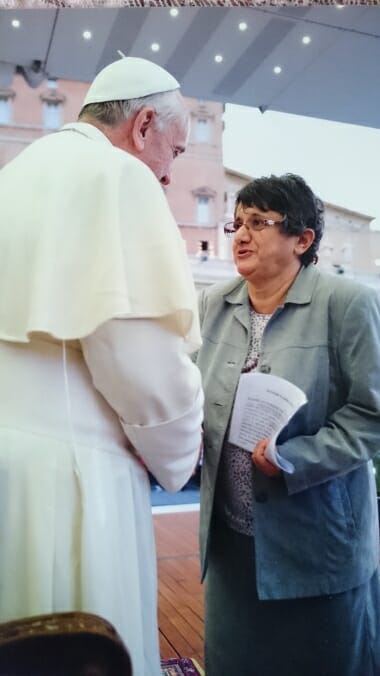 We don’t feel at all like heroes, because we are not here for personal motives. Before leaving I was able to meet Pope Francis: his encouraging words made me feel the love of the Church that draws near to this people that is undergoing such a hard trial. We also feel supported by the love of the Focolare Movement throughout the world. We need that support in order to not lose hope, powerless as we are in front of the supremecy of economic interests, and the international proliferation of weapons on the global market. We celebrate anniversaries; we create recreational moments for children and adults, in order to relieve the stress. We organise moments of spirituality; we pray together for peace. At Christmas our young people organised a concert. Three hundred people attended, including Muslims. Recently we celebrated a wedding. Two children were killed in that family and, because of mourning customs, that young woman couldn’t leave the house dressed as a bride. Therefore, she left from the focolare house, accompanied by all of us. We try to be involved in local Church projects and those of other ecclesial groups, so that we can help to wipe away a bit of suffering and deprivation amongst the people. We continue together to hope and believe, as we support every effort for the coming of peace.
We don’t feel at all like heroes, because we are not here for personal motives. Before leaving I was able to meet Pope Francis: his encouraging words made me feel the love of the Church that draws near to this people that is undergoing such a hard trial. We also feel supported by the love of the Focolare Movement throughout the world. We need that support in order to not lose hope, powerless as we are in front of the supremecy of economic interests, and the international proliferation of weapons on the global market. We celebrate anniversaries; we create recreational moments for children and adults, in order to relieve the stress. We organise moments of spirituality; we pray together for peace. At Christmas our young people organised a concert. Three hundred people attended, including Muslims. Recently we celebrated a wedding. Two children were killed in that family and, because of mourning customs, that young woman couldn’t leave the house dressed as a bride. Therefore, she left from the focolare house, accompanied by all of us. We try to be involved in local Church projects and those of other ecclesial groups, so that we can help to wipe away a bit of suffering and deprivation amongst the people. We continue together to hope and believe, as we support every effort for the coming of peace.
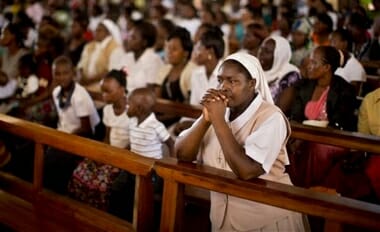
Apr 15, 2015 | Focolare Worldwide, Senza categoria
”The slaughter in Garissa took place on Good Friday. 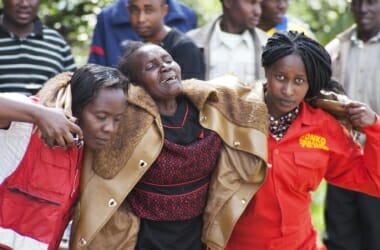 I went to the morgue where they were taking the bodies of the students for identification, not far from my home in Nairobi. I took my camera along. It was impossible not to hear the sirens. I found the parents of the murdered students fainting on one side. . . and on ther other my colleagues with news cameras. I could certainly have shot a few interviews, but I just couldn’t do it; I found myself weeping with the families. There was strong pressure from all sides, opinions from the public who were anxious for news. But I needed time to digest the painful situation in order to be able to say something that would be constructive. I felt my task was to remain quiet with this pain and resist the pressure.”
I went to the morgue where they were taking the bodies of the students for identification, not far from my home in Nairobi. I took my camera along. It was impossible not to hear the sirens. I found the parents of the murdered students fainting on one side. . . and on ther other my colleagues with news cameras. I could certainly have shot a few interviews, but I just couldn’t do it; I found myself weeping with the families. There was strong pressure from all sides, opinions from the public who were anxious for news. But I needed time to digest the painful situation in order to be able to say something that would be constructive. I felt my task was to remain quiet with this pain and resist the pressure.” 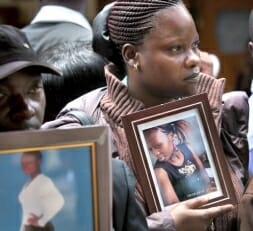 There were over 150 victims of the attack by Somali extremists at the Garissa University College in North East Kenya. The terrorists began their attack on April 3rd, targeting the Christian students. It was only a day-long front attack by government forces that prevented an even worse slaughter. But the general fear of new attacks remains so high that any incident is enough to unleash panic with very serious consequences as happened on April 12th in another university college at Uthiru, near Nairobi. An electrical transfomer caught fire on the fourth and fifth floor, causing an explosion that was similar to that of the bomb. The number of the dead reached 150 with several others seriously wounded. “From the first days of the attack, many of us from our community were in the morgue where 148 bodies of murdered students were taken, in order to console the people who had lost children,” Charles Besigye from the local Focolare community recounts. “Today, on April 11th, we and some of our young people spent the afternoon at the morgue. It was so heartbreaking! People in total suspense who, a week later have not yet found their children. Some bodies have already been identified and they are carrying them back to their villages for burial. The suffering is huge. . . the relatives a desperate sight.We stayed with them to share their suffering, and to help them carry this heavy cross. To weep with those who are still able to, because there are some who have no more tears to shed. One of us offered to help prepare the bodies of the deceased students before their relatives saw them. It was a powerful experience! There’s much solidarity on the part of several associations and the Kenyan people. They bring bread, milk, beverages, and so on. . . The sacred atmosphere that we breathe is overwhelming. There are people who offer comfort, others who pray to God.”
There were over 150 victims of the attack by Somali extremists at the Garissa University College in North East Kenya. The terrorists began their attack on April 3rd, targeting the Christian students. It was only a day-long front attack by government forces that prevented an even worse slaughter. But the general fear of new attacks remains so high that any incident is enough to unleash panic with very serious consequences as happened on April 12th in another university college at Uthiru, near Nairobi. An electrical transfomer caught fire on the fourth and fifth floor, causing an explosion that was similar to that of the bomb. The number of the dead reached 150 with several others seriously wounded. “From the first days of the attack, many of us from our community were in the morgue where 148 bodies of murdered students were taken, in order to console the people who had lost children,” Charles Besigye from the local Focolare community recounts. “Today, on April 11th, we and some of our young people spent the afternoon at the morgue. It was so heartbreaking! People in total suspense who, a week later have not yet found their children. Some bodies have already been identified and they are carrying them back to their villages for burial. The suffering is huge. . . the relatives a desperate sight.We stayed with them to share their suffering, and to help them carry this heavy cross. To weep with those who are still able to, because there are some who have no more tears to shed. One of us offered to help prepare the bodies of the deceased students before their relatives saw them. It was a powerful experience! There’s much solidarity on the part of several associations and the Kenyan people. They bring bread, milk, beverages, and so on. . . The sacred atmosphere that we breathe is overwhelming. There are people who offer comfort, others who pray to God.” During the Way of the Cross at the Roman Colosseum on the evening of Good Friday, the Pope used harsh words: “The thirst of Your Merciful Father,” said Pope Francis, “which in You wished to embrace, forgive and save humanity, makes us think of the thirst of our persecuted brothers and sisters, beheaded and crucified for their faith in You, right beneath our eyes, or often with our complicit silence.” It is a strong warning that urges us not to remain silent.
During the Way of the Cross at the Roman Colosseum on the evening of Good Friday, the Pope used harsh words: “The thirst of Your Merciful Father,” said Pope Francis, “which in You wished to embrace, forgive and save humanity, makes us think of the thirst of our persecuted brothers and sisters, beheaded and crucified for their faith in You, right beneath our eyes, or often with our complicit silence.” It is a strong warning that urges us not to remain silent.
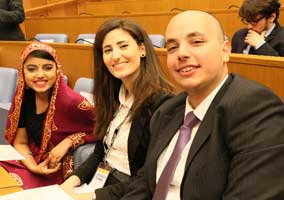
Mar 18, 2015 | Focolare Worldwide, Senza categoria

Lara Abou Moussa and George Zahm
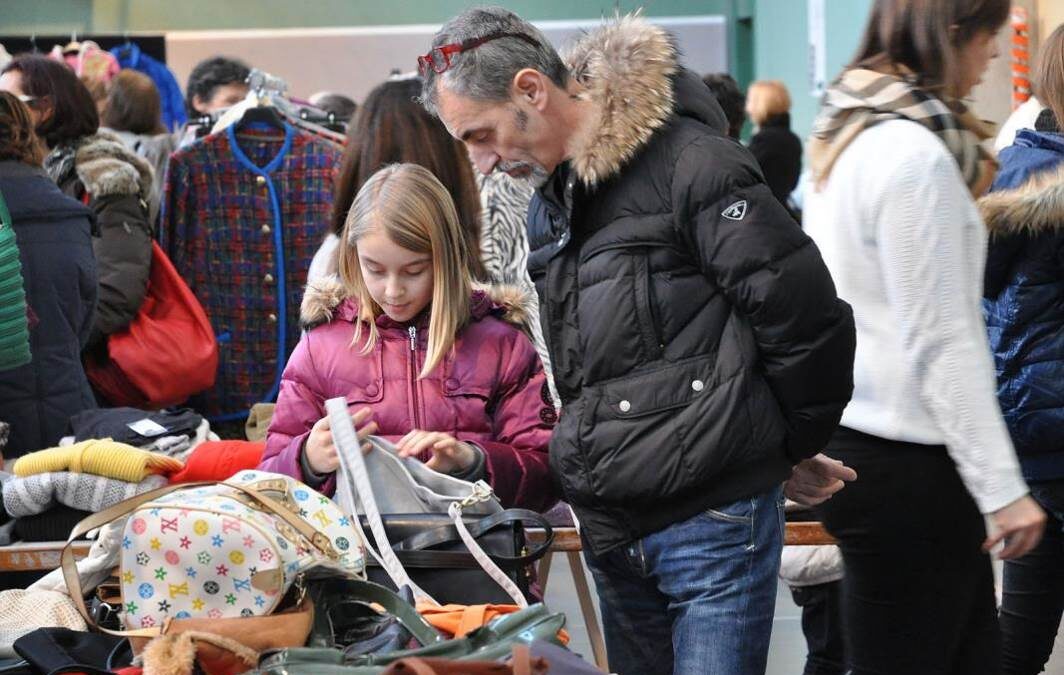
Mar 13, 2015 | Focolare Worldwide, Senza categoria
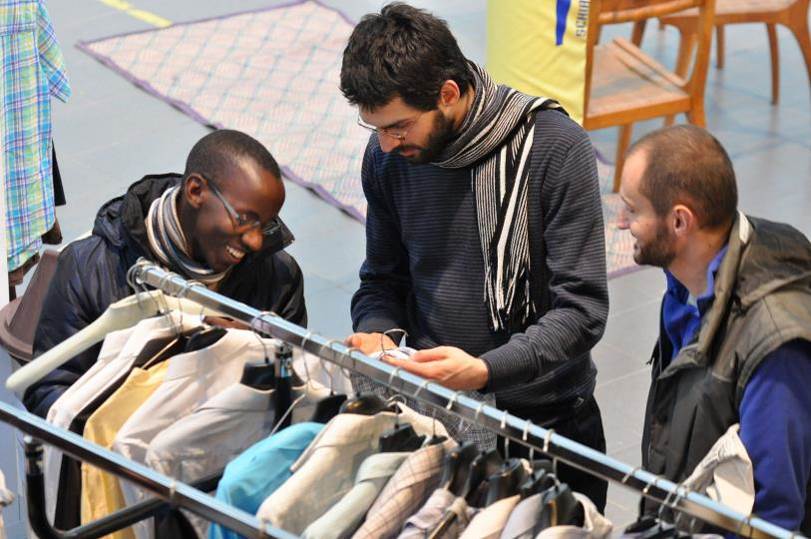 This permanent sharing of goods helps many who are in need during the current economic crisis.” These are the first words of a document describing the Bundle Project which began in May in Loppiano. The carrying of a bundle, or swag, is associated with a vagabond. It was used to hold a few poor possessions and therefore associated with the poor. For Chiara Lubich it signified sharing, giving and redistributing material possessions among the members of the nascent Focolare community of the mid-1040s. This is how a practice was begun of freely depriving oneself of what was excess, or even necessary, in order to share a gift with those in need. That is the origin of the bundle, which has now found a home at the Lionello Bonfanti Business Park in Loppiano, a meeting place between those who have something to share and those who are in need. “Three thousand people have already shown up,” say coordinating team members Roberta Menichetti and Araceli Bigoni,“mostly families who live in the region.” Up until today thousands of clothing items, home furnishings, books, tools, utensils and games as well as intangible items such as time, talents, and availability – have come and gone off with new owners.”
This permanent sharing of goods helps many who are in need during the current economic crisis.” These are the first words of a document describing the Bundle Project which began in May in Loppiano. The carrying of a bundle, or swag, is associated with a vagabond. It was used to hold a few poor possessions and therefore associated with the poor. For Chiara Lubich it signified sharing, giving and redistributing material possessions among the members of the nascent Focolare community of the mid-1040s. This is how a practice was begun of freely depriving oneself of what was excess, or even necessary, in order to share a gift with those in need. That is the origin of the bundle, which has now found a home at the Lionello Bonfanti Business Park in Loppiano, a meeting place between those who have something to share and those who are in need. “Three thousand people have already shown up,” say coordinating team members Roberta Menichetti and Araceli Bigoni,“mostly families who live in the region.” Up until today thousands of clothing items, home furnishings, books, tools, utensils and games as well as intangible items such as time, talents, and availability – have come and gone off with new owners.” 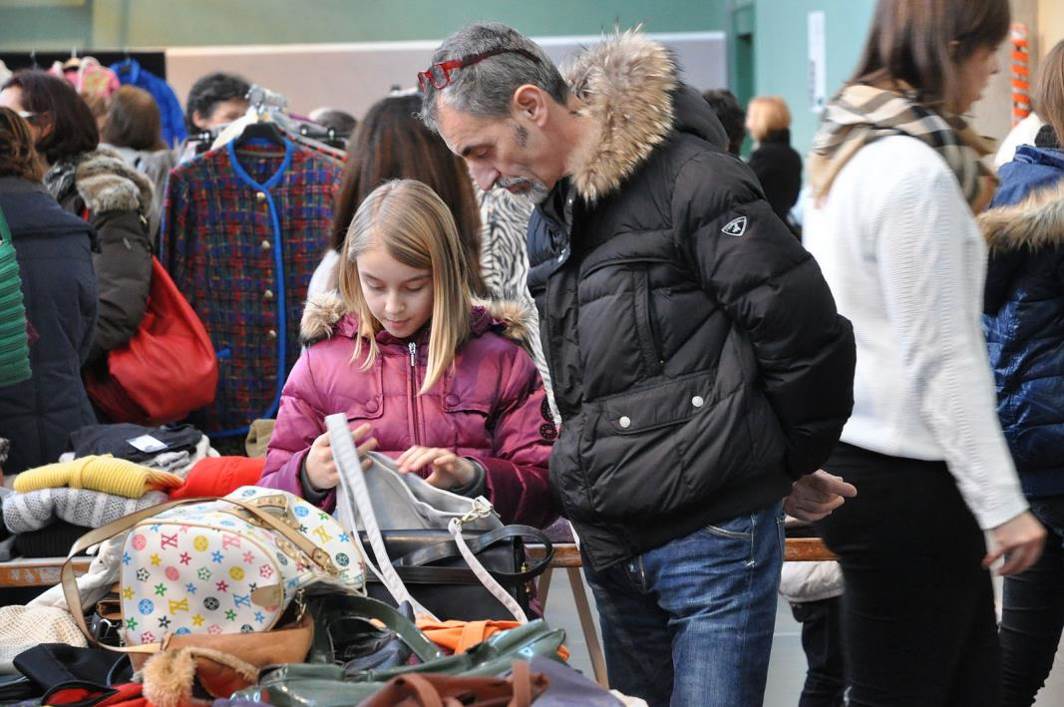 “It’s not by coincidence that the project is hosted in the Lionello Bonfanti Business Park,” reiterates Eva Gullo, President of the EoC Association which administrates the Business Park. “This space is ‘home’ to all the components of the Economy of Communion. It is also dedicated to spreading the ‘culture of giving’, that is, the ability to contribute to the the social welfare beginning from one’s self.” There are many stories of generosity surrounding this project. Like the family that was living in some buildings on the parish grounds of a nearby town. When they were able to move into a small house, they found all the furnishings for their new home here at this opportunity shop. Our network of friends also arranged for the transport and set up of the small house at zero cost. Words like “providence” and “trust” are quite common around here. Like that afternoon when an infant’s crib was found and, just as it was taken away, another request was made for the same type of crib. Not even a half hour later the new crib arrived! The Bundle Project won the “Engaging in Society” award offered by the New Poverty Section of the Catholic Insurance Foundation. Those funds will be used for a more functional layout of the premises. Evening events were begun as a result of the sharing and giving. Formation courses and evening discussions with experts in the field, on topics such as consumerism, relational goods and trust, as well as training courses in economic approaches that are centred on the dignity of the human person. There is a “contributions” box at the entrance for anyone who wishes to leave a few euros for what they have found. The monies collected in the box have been used to pay the insurance bills of some local people and even the basic needs of others. Source: Loppiano online Source: Loppiano permanent sharing of goods project
“It’s not by coincidence that the project is hosted in the Lionello Bonfanti Business Park,” reiterates Eva Gullo, President of the EoC Association which administrates the Business Park. “This space is ‘home’ to all the components of the Economy of Communion. It is also dedicated to spreading the ‘culture of giving’, that is, the ability to contribute to the the social welfare beginning from one’s self.” There are many stories of generosity surrounding this project. Like the family that was living in some buildings on the parish grounds of a nearby town. When they were able to move into a small house, they found all the furnishings for their new home here at this opportunity shop. Our network of friends also arranged for the transport and set up of the small house at zero cost. Words like “providence” and “trust” are quite common around here. Like that afternoon when an infant’s crib was found and, just as it was taken away, another request was made for the same type of crib. Not even a half hour later the new crib arrived! The Bundle Project won the “Engaging in Society” award offered by the New Poverty Section of the Catholic Insurance Foundation. Those funds will be used for a more functional layout of the premises. Evening events were begun as a result of the sharing and giving. Formation courses and evening discussions with experts in the field, on topics such as consumerism, relational goods and trust, as well as training courses in economic approaches that are centred on the dignity of the human person. There is a “contributions” box at the entrance for anyone who wishes to leave a few euros for what they have found. The monies collected in the box have been used to pay the insurance bills of some local people and even the basic needs of others. Source: Loppiano online Source: Loppiano permanent sharing of goods project
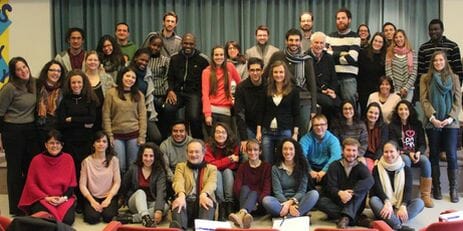
Mar 1, 2015 | Senza categoria
 The experiment was the choice of a mountain setting for the inter-disciplinary and inter-cultural academic event, according to the teaching and learning methodology typical of IUS. This sparked up the idea of holding the first International Winter School of the Sophia University Institute (IUS), that ended on 15 February, organised with the patronage of the Autonomous Province of Trent and the Rural Banks and Cooperation Federation of Trent. The participants from 18 countries who were hosted at the Mariapolis Center named after Chiara Lubich, in her native land, felt really privileged to be so warmly welcomed by the city of Trent. In a situation in which change is guided by technology and political-economic challenges, the workshop focused on understanding creativity and innovation in the light of the “culture of unity” and the added value it offers. For example, making room for and recognising diversity also when this may be a potential cause of conflict. Besides the lessons in the classroom and work group sessions as planned, before and after the excursions and sports activities, the reflections on sports and bodily expressions offered an ulterior and original interpretation of the themes proposed. Particularly effective was the soiree opened to the city «Captain, my captain,» conducted by Paolo Crepaz of Sportmeet, in a dialogue with 3 captains of top professional sports teams. The dialogue also covered the queries and the resources of our time, that urge us to think big and act consequently. At the end, some participants also gave their personal impressions. F.S., Business Communications graduate, and a doctorate on Microcredit and Microfinance said: “I will not forget two things I learned: the methodology of interdisciplinarity – we cannot think of know-how as isolated fragments– and the need to build relationships based on deep knowledge of ourselves and our own disciplines, in order to go towards the other and be enriched by the other’s discipline. I will try to bring ahead the dynamics of this workshop – listening, reciprocity, sharing ,– in everyday life.” G.F. a Social Sciences student: “The novelty lies in the effort you spoke about, of focusing on the relationship between sports and the culture of unity, in the perspective of an integral vision of the person and society: we still have a lot more to discovery.” M.P. a Natural Sciences graduate: “I knew nothing about Sophia… I think it is a worthy answer to our times. In the same way as in the ecosystem, where all is interconnected, I believe that whatever we do has its impact without exclusions and at all latitudes. We are all called to dialogue, fully aware of the consequences of our actions.” C.G., at the end of his doctorate in Constitutional Law : “It’s great to start the day with the moment of reflection on the “starting point” – the in-depth study of a short passage of the Scriptures to be translated into daily life – so as to give a framework to one’s day, a starting point. Now I can also give my contribution… and build the spirit of Sophia in my university.” Source: Sophia online
The experiment was the choice of a mountain setting for the inter-disciplinary and inter-cultural academic event, according to the teaching and learning methodology typical of IUS. This sparked up the idea of holding the first International Winter School of the Sophia University Institute (IUS), that ended on 15 February, organised with the patronage of the Autonomous Province of Trent and the Rural Banks and Cooperation Federation of Trent. The participants from 18 countries who were hosted at the Mariapolis Center named after Chiara Lubich, in her native land, felt really privileged to be so warmly welcomed by the city of Trent. In a situation in which change is guided by technology and political-economic challenges, the workshop focused on understanding creativity and innovation in the light of the “culture of unity” and the added value it offers. For example, making room for and recognising diversity also when this may be a potential cause of conflict. Besides the lessons in the classroom and work group sessions as planned, before and after the excursions and sports activities, the reflections on sports and bodily expressions offered an ulterior and original interpretation of the themes proposed. Particularly effective was the soiree opened to the city «Captain, my captain,» conducted by Paolo Crepaz of Sportmeet, in a dialogue with 3 captains of top professional sports teams. The dialogue also covered the queries and the resources of our time, that urge us to think big and act consequently. At the end, some participants also gave their personal impressions. F.S., Business Communications graduate, and a doctorate on Microcredit and Microfinance said: “I will not forget two things I learned: the methodology of interdisciplinarity – we cannot think of know-how as isolated fragments– and the need to build relationships based on deep knowledge of ourselves and our own disciplines, in order to go towards the other and be enriched by the other’s discipline. I will try to bring ahead the dynamics of this workshop – listening, reciprocity, sharing ,– in everyday life.” G.F. a Social Sciences student: “The novelty lies in the effort you spoke about, of focusing on the relationship between sports and the culture of unity, in the perspective of an integral vision of the person and society: we still have a lot more to discovery.” M.P. a Natural Sciences graduate: “I knew nothing about Sophia… I think it is a worthy answer to our times. In the same way as in the ecosystem, where all is interconnected, I believe that whatever we do has its impact without exclusions and at all latitudes. We are all called to dialogue, fully aware of the consequences of our actions.” C.G., at the end of his doctorate in Constitutional Law : “It’s great to start the day with the moment of reflection on the “starting point” – the in-depth study of a short passage of the Scriptures to be translated into daily life – so as to give a framework to one’s day, a starting point. Now I can also give my contribution… and build the spirit of Sophia in my university.” Source: Sophia online

 «There is much talk here about the building of a common European home. We are convinced, however, that although this endeavour is very necessary, it will not be complete unless we think of it as a part of that “global village” that is now the Earth on which we live. This idea came to me also from the concern expressed in your letter about the precarious condition of our natural environment. (…) In fact, there are increasingly alarming analyses from scientists, politicians and international commissions about our ecosystem. People everywhere are launching proposals in an effort to heal our ailing world. (…) In the final analysis, ecology represents a challenge which can be met only by changing mentalities and forming consciences. It has already been demonstrated by very competent scientific studies that neither technical nor economic resources are lacking for the improvement of our environment. Instead, what is lacking is that spiritual supplement, that new love for the human person, which makes all of us feel responsible towards all the others in a common effort to manage the resources of the earth in an intelligent, just and balanced manner.(…) This question of a just distribution of goods in the world, of helping the poorer populations, of the solidarity of the north towards the south, of the rich towards the poor, is the other side of the ecological crisis. If the immense economic resources destined to boost the war industry and a super-production that requires more and more super-consumption, not to mention the waste of goods in the wealthy countries, if these enormous resources would serve, at least in part, to help the developing countries find their dignified way towards development, how much more breathable the atmosphere would be, how many forests would be spared, how many zones would not become desert wastelands, and how many human lives would be saved! (…) And yet, without a new awareness of universal solidarity, we will never take a step forward. (…) If human beings are not at peace with God, the earth itself is not at peace. Religious people are aware of the earth’s “suffering” when human beings do not use it according to the plan of God, but only for selfishness, for an insatiable desire to possess. This selfishness and desire contaminate the environment more and before any other kind of pollution, which is nothing other than its consequence. (…) Now the disastrous consequences force us to look at reality all together, in the perspective of a united world. If we don’t face this problem all together it will not be resolved. (…) If one discovers that all creation is a gift of a Father who loves us, it will be much easier to find a harmonious relationship with nature. And if one discovers also that this gift is for all members of the human family and not only for a few, more attention and respect will be given for something that belongs to the whole of humanity, present and future». Continue Reading
«There is much talk here about the building of a common European home. We are convinced, however, that although this endeavour is very necessary, it will not be complete unless we think of it as a part of that “global village” that is now the Earth on which we live. This idea came to me also from the concern expressed in your letter about the precarious condition of our natural environment. (…) In fact, there are increasingly alarming analyses from scientists, politicians and international commissions about our ecosystem. People everywhere are launching proposals in an effort to heal our ailing world. (…) In the final analysis, ecology represents a challenge which can be met only by changing mentalities and forming consciences. It has already been demonstrated by very competent scientific studies that neither technical nor economic resources are lacking for the improvement of our environment. Instead, what is lacking is that spiritual supplement, that new love for the human person, which makes all of us feel responsible towards all the others in a common effort to manage the resources of the earth in an intelligent, just and balanced manner.(…) This question of a just distribution of goods in the world, of helping the poorer populations, of the solidarity of the north towards the south, of the rich towards the poor, is the other side of the ecological crisis. If the immense economic resources destined to boost the war industry and a super-production that requires more and more super-consumption, not to mention the waste of goods in the wealthy countries, if these enormous resources would serve, at least in part, to help the developing countries find their dignified way towards development, how much more breathable the atmosphere would be, how many forests would be spared, how many zones would not become desert wastelands, and how many human lives would be saved! (…) And yet, without a new awareness of universal solidarity, we will never take a step forward. (…) If human beings are not at peace with God, the earth itself is not at peace. Religious people are aware of the earth’s “suffering” when human beings do not use it according to the plan of God, but only for selfishness, for an insatiable desire to possess. This selfishness and desire contaminate the environment more and before any other kind of pollution, which is nothing other than its consequence. (…) Now the disastrous consequences force us to look at reality all together, in the perspective of a united world. If we don’t face this problem all together it will not be resolved. (…) If one discovers that all creation is a gift of a Father who loves us, it will be much easier to find a harmonious relationship with nature. And if one discovers also that this gift is for all members of the human family and not only for a few, more attention and respect will be given for something that belongs to the whole of humanity, present and future». Continue Reading




 I went to the morgue where they were taking the bodies of the students for identification, not far from my home in Nairobi. I took my camera along. It was impossible not to hear the sirens. I found the parents of the murdered students fainting on one side. . . and on ther other my colleagues with news cameras. I could certainly have shot a few interviews, but I just couldn’t do it; I found myself weeping with the families. There was strong pressure from all sides, opinions from the public who were anxious for news. But I needed time to digest the painful situation in order to be able to say something that would be constructive. I felt my task was to remain quiet with this pain and resist the pressure.”
I went to the morgue where they were taking the bodies of the students for identification, not far from my home in Nairobi. I took my camera along. It was impossible not to hear the sirens. I found the parents of the murdered students fainting on one side. . . and on ther other my colleagues with news cameras. I could certainly have shot a few interviews, but I just couldn’t do it; I found myself weeping with the families. There was strong pressure from all sides, opinions from the public who were anxious for news. But I needed time to digest the painful situation in order to be able to say something that would be constructive. I felt my task was to remain quiet with this pain and resist the pressure.” 




